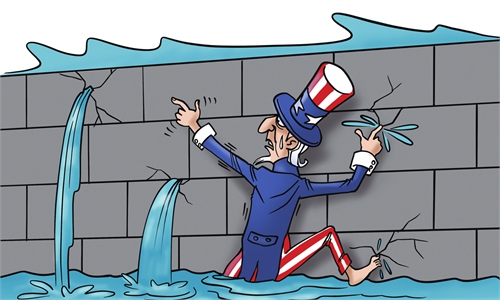
Illustration: Chen Xia/GT
In an interview with German broadcaster Deutsche Welle on Wednesday, former president George W. Bush criticized the withdrawal of US and other NATO troops from Afghanistan as "a mistake." His statement was reminiscent of the neoconservatism that deeply influenced Washington when Bush launched the Afghan war.
Neoconservatism played a prevailing role in the US 20 years ago. It addressed the question of how the US would act on the international stage after the end of the Cold War, when there was no other global adversary like the Soviet Union. The core of this political ideology was that the US should be proactive in blowing a strike to its enemies and threats.
When Bush Jr. was in office, Washington launched the wars in Afghanistan and in Iraq, leading the US to be bogged down in the wars for the past 20 years. These courses of action finally failed to achieve its goals by waging wars. The US once believed that it could take the initiative to deal with affairs it felt threatened by. More importantly, Washington believed it was able to enhance security conforming to its standards and gain interests by "nation building" overseas.
Regime change is one of the core elements of neoconservatism. But the Afghan war has made it clear to Americans that it is completely unrealistic for the US to attempt to rebuild another country on its own. Going down the road of such an interminable crusade did not bring about the results neoconservatives had hoped for.
The foreign policies under Bush were also labeled by some neoconservatives as a distinctly American internationalism - with "American exceptionalism" as the basis. Currently, American exceptionalism still affects the US' domestic and foreign policies in many spheres. However, neoconservatism has long since faded away from the mainstream of today's debates in the US about strategic and foreign policies.
The overseas wars launched by Bush gradually made neoconservatism unpopular in the US. Indeed, the ineffectiveness of these wars dealt a heavy blow to neoconservatism. Bush also began to gradually revise his cowboy style moves in his second term. He paid attention to repairing relations with US' allies on the international stage. He lowered the tone of forestalling the targets, and refrained from talking about regime change when dealing with the so-called "evil" countries. Instead, he became more willing to use multilateral and peaceful ways to deal with problems in the world, taking a multinational course.
But the US' strategic vision of using war and other means to proactively transform the world will not be fundamentally weakened. Even the failures of the Afghan war will not have a decisive impact on the debate over American military operations and strategy overseas. This is because the strategic and policy choices of the US are based on American characteristics - the US considers itself "a city upon a hill" that has a distinctive and superior political system that serves as an example for the rest of the world.
So even though neoconservatism is declining, some of its theories still carry influence. In some ways, waves of populism led by Donald Trump are way more extreme than neoconservatism. Trump even thought about starting a war with Iran when he was in office. Therefore, the failure of the wars in Afghanistan and Iraq will not change the fundamental nature of the US' strategic culture. The US decided to withdraw from Iraq and Afghanistan, and shift focus to the Indo-Pacific region. This decision was made based on factors such as Washington's judgment of its own interests and domestic politics.
At present, the US is adopting an overtly interventionist policy over the Taiwan question. This policy is decided by the US strategic culture. In fact, the US emphasizes its role as the only country with absolute political, economic, cultural, and military dominance in the world. Because of this, it wants to suppress and contain other civilizations to build a unipolar world. In this light, China will continue to face a US siege in terms of geopolitics and security.
The author is a professor of international relations at Nanjing University. opinion@globaltimes.com.cn

